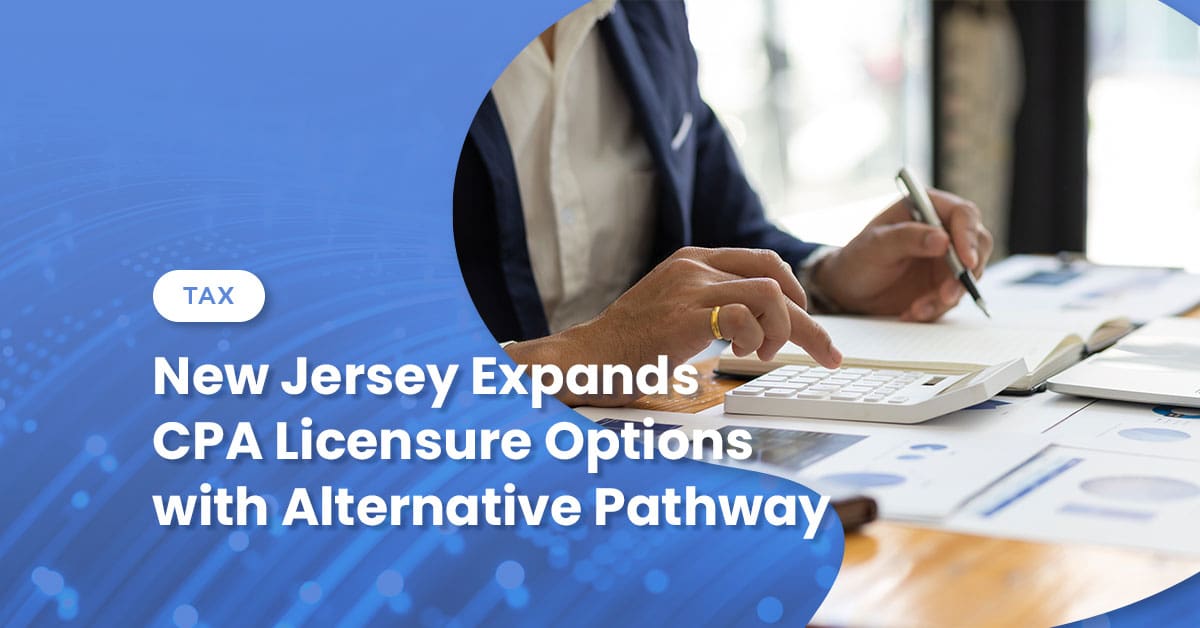On January 13, 2020, Governor Phil Murphy signed into law Senate Bill 3246 establishing the business alternative income tax, an elective New Jersey business tax for pass-through entities. A corresponding refundable state gross income tax credit is allowed for the owners of the pass-through entities to offset personal or corporate income tax liability. The pass-through entity tax applies to tax years beginning on or after January 1, 2020. The intent of the new legislation is to help individual taxpayers work around the state and local tax limitation that was introduced as part of the federal tax reform Tax Cuts and Jobs Act. For federal purposes, an individual’s itemized deductions for state and local taxes in excess of $10,000 are disallowed as part of the Tax Cuts and Jobs Act. The limitation does not apply at the entity level so states have been responding by introducing state entity level taxes that would allow taxpayers a state deduction for taxes at the entity level for federal purposes. States such as Connecticut, Louisiana, Oklahoma, Rhode Island, Wisconsin and now New Jersey have introduced similar legislation.
Under the bill, New Jersey pass-through entities (partnerships, limited liability companies, or S corporations) can elect to pay an entity-level business alternative income tax. A proportionate share of the business alternative income tax paid by a pass-through entity is credited to the pass-through entity owners’ Gross Income Tax or Corporation Business Tax liability. Pass-through entity members can claim a refundable credit equal to 100% of the member’s pro-rata share of the business alternative tax paid by the pass-through entity. The credit applies against the member’s New Jersey gross income tax liability in the same tax year after all other credits available to the member have been applied. If the credit exceeds the tax liability of the pass-through entity owner, any excess shall be treated as an overpayment without any accrual of overpayment interest. New Jersey allows a credit to resident taxpayers for taxes paid to other state taxing jurisdictions. Under the new legislation, a resident taxpayer is also allowed a credit against their New Jersey tax for amounts that are paid by the pass-through to other states, and which are determined to be substantially similar to the New Jersey pass-through entity tax. The credit may not exceed the proportion of the tax otherwise due that the amount of the taxpayer’s income subject to tax by the other jurisdiction bears to the member’s entire New Jersey net income.
For members that are corporations, the credit can be used against corporation business tax as well as the temporary New Jersey surtax imposed through 2021. The credit cannot be used to offset the New Jersey state minimum tax applicable to corporations. If unused, the credit can be carried forward for twenty years by corporations. The bill also allows a corporate member of the pass-through entity that is exempt from New Jersey corporation business tax to have its share of the credit refunded.
Under the bill, only a pass-through entity with at least one owner subject to the NJ Gross Income Tax can elect to pay the business alternative income tax. The election to pay tax at the entity level is available if consent is made by all members of the electing entity who is a member at the time the election is filed or by an authorized officer, manager, or member of the electing entity. The election must be made annually on or before the due date of the entity’s return. The election cannot be made retroactively and if the members wish to revoke an election, that revocation shall occur on or before the due date of the entity’s return.
The business alternative income tax is imposed at tax rates ranging from 5.675% to 10.9% based on the collective sum of all of the pass-through entity’s members’ shares of distributive proceeds for the tax year. The pass-through entity tax return is due on or before the 15th day of the third month following the close of the entity’s tax year. Electing pass-through entities must make estimated tax payments on or before the fifteenth day of the fourth, sixth and ninth months of the tax year, and the fifteenth day of the first month of the subsequent year.
The business alternative income tax can potentially allow New Jersey pass-through entity owners a workaround for the state tax deduction limitation at the individual level. It is uncertain, however, whether the U.S. Treasury will challenge this new entity level tax as nondeductible. We will be monitoring the situation as it progresses. For additional information regarding this update, please contact us for more information.
Evan D. Gernant | Tax Partner
(973) 577-2868

 Previous
Previous






